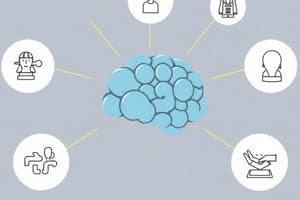Podcast
Questions and Answers
What is motivation?
What is motivation?
- A way to reduce stress
- The desire to do something; an impulse that inspires some action (correct)
- The desire to do nothing
- An instinctive behavior
What is a motive?
What is a motive?
- A form of social pressure
- A specific need or desire that prompts goal-directed behavior (correct)
- An external reward
- An unlearned behavior
What are the 6 theories of motivation?
What are the 6 theories of motivation?
Instinct Theory, Drive-Reduction Theory, Arousal Theory, Incentive Theory, Hierarchy of Needs, Achievement Motivation
What is Instinct Theory in motivation?
What is Instinct Theory in motivation?
What are the limitations of Instinct Theory?
What are the limitations of Instinct Theory?
What is Drive-Reduction Theory?
What is Drive-Reduction Theory?
What are the two types of drives?
What are the two types of drives?
What is a primary drive?
What is a primary drive?
What is a secondary drive?
What is a secondary drive?
What are the limitations of Drive Reduction Theory?
What are the limitations of Drive Reduction Theory?
What is Arousal Theory?
What is Arousal Theory?
What does the Yerkes-Dodson Law state?
What does the Yerkes-Dodson Law state?
What is Incentive Theory?
What is Incentive Theory?
What is the Hierarchy of Needs theory?
What is the Hierarchy of Needs theory?
What are the levels of the Hierarchy of Needs?
What are the levels of the Hierarchy of Needs?
What is Achievement Motivation?
What is Achievement Motivation?
What are the two types of achievement motivation?
What are the two types of achievement motivation?
What is intrinsic motivation?
What is intrinsic motivation?
What is extrinsic motivation?
What is extrinsic motivation?
What does the lateral hypothalamus do?
What does the lateral hypothalamus do?
What does the ventromedial hypothalamus (VMH) do?
What does the ventromedial hypothalamus (VMH) do?
What is the Set-point Theory?
What is the Set-point Theory?
What can trigger hunger?
What can trigger hunger?
Study Notes
Motivation and Emotion
- Motivation: Desire to engage in a behavior; an impulse directing action.
- Motive: A specific need or desire driving goal-oriented behavior.
Theories of Motivation
-
Instinct Theory: Behavior driven by innate instincts; historically linked to Darwin’s work. Survival instincts are foundational.
-
Limitations of Instinct Theory: More applicable to animals than humans; fails to account for learned behaviors and diversity in human actions.
-
Drive-Reduction Theory: Physiological needs create drives motivating actions; aims to achieve homeostasis—a stable internal condition.
-
Types of Drives:
- Primary Drives: Unlearned and necessary for survival (hunger, thirst, sex).
- Secondary Drives: Learned behaviors related to desires like wealth and success.
-
Limitations of Drive-Reduction Theory: Achieving homeostasis wouldn’t explain all behaviors; fails to account for thrill-seeking.
-
Arousal Theory: Motivation relates to seeking optimal arousal; varies by individual. We seek more stimulation when lacking and less when overstimulated.
-
Yerkes-Dodson Law: Optimal arousal improves performance; complex tasks require lower arousal levels.
-
Incentive Theory: Motivation arises from external stimuli and rewards that entice specific behaviors.
Hierarchy of Needs
- Theory: Needs are prioritized from basic physiological requirements to higher psychological aspirations.
- Levels:
- Physiological Needs (breathing, thirst)
- Safety Needs
- Belongingness and Love Needs
- Esteem Needs
- Self-Actualization Needs: Achieving full potential.
Achievement Motivation
- Reflects the desire for significant accomplishments and long-term goals; linked to persistence and internal standards.
- Types of Achievement Motivation:
- Intrinsic Motivation: Driven by internal satisfaction, such as hobbies.
- Extrinsic Motivation: Driven by external rewards or avoidance of punishment, like grades.
Brain and Hunger Regulation
- Lateral Hypothalamus (LH): Stimulates hunger; damage leads to no interest in eating.
- Ventromedial Hypothalamus (VMH): Suppresses hunger; damage causes excessive eating.
Set-Point Theory
- The hypothalamus regulates optimal body weight like a thermostat; below set-point triggers hunger, while reaching it signals to stop eating. Individual set-points may vary.
Hunger Triggers
- Environmental cues and emotional connections to specific foods can stimulate biological hunger responses.
Studying That Suits You
Use AI to generate personalized quizzes and flashcards to suit your learning preferences.
Description
Test your knowledge of key concepts in motivation and emotion with these flashcards. Cover foundational theories and definitions that inspire human behavior. Perfect for psychology students or anyone interested in understanding what drives us.



